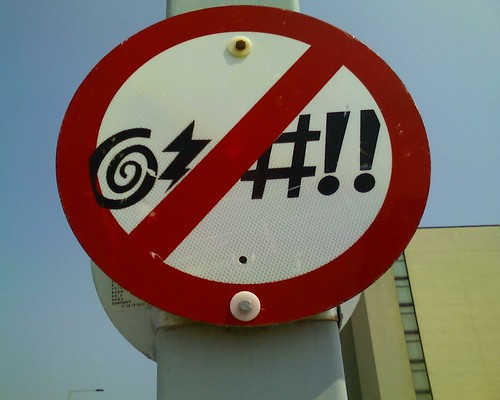 In college, I majored in radio. Back then, in the days vinyl still ruled, the common nightmare was not being able to put the needle on the record, much like the victim in the horror movie who couldn’t get the car keys into the lock in time. The result was not slasher death, but dead air was close enough. Another waking dread was leaving the microphone on and saying one of George Carlin’s Seven Words.
In college, I majored in radio. Back then, in the days vinyl still ruled, the common nightmare was not being able to put the needle on the record, much like the victim in the horror movie who couldn’t get the car keys into the lock in time. The result was not slasher death, but dead air was close enough. Another waking dread was leaving the microphone on and saying one of George Carlin’s Seven Words.
Why do I bring this up? The new nightmare for brand marketers is putting the wrong message over social media. Worse than dead air, the misguided and often offensive message is what keeps many of us Tweeters and Facebookers up at night.
There is no shortage of examples:
- Chrysler’s Tweeter profanely complaining about Detroit traffic– whoops!
- An agency guy complaining about/insulting his client’s home city – ohmygosh!
- The nonprofit worker talking about getting slizzered on the nonprofit’s Twitter account – oh my!
- Kenneth Cole making light of violence in Egypt to promote a shoe sale – faux pas!
Add to that two high-profile examples from the past week or so:
- KitchenAid’s Twitter account publishing a highly-offensive message about Obama – O-No!
- Stubhub’s Twitter account taking a rather profane approach to the “TGIF” Tweet – Holy $%&#!
Each case is different, and the reactions – and consequences – have also been different. Since I am someone who helps brands manage their online social media presence, I have my own waking nightmares of having this happen. Thus, I have a few thoughts:
- Most of these problems happen with Twitter. That is not an absolute, but Twitter is especially dangerous due to its ephemeral nature. Many times we publish and move on, and it’s easy to make a mistake. In the early days of Twitter I had the occasional private direct message go public due to a simple mistake. I survived, but as these brand issues show that can be a matter of luck or circumstance.
- I use Tweetdeck as my personal social publishing tool. I use it largely for Twitter and Facebook, but under no circumstances do I add client accounts. I know myself too well, hilarity would not
 ensue.
ensue. - I use separate browsers when logging in to a client or corporate social account. The best side effect of the Browser Wars is that I can have my own accounts on Google Chrome, and client’s in, say, Safari or Firefox- think of it as using separate kitchens to bake cookies due to peanut allergy. Actually, that’s a stretch, but that’s the best analogy you’re going to get when I write on a Monday night.
Always log out. What’s a bigger pain, logging in anew for each session or explaining how that offensive Tweet got on the corporate account? I’d let you think about it but if you have to think about it I don’t want you in charge.- Don’t be profane in your personal accounts. Anyone who knows me well knows I can swear like a truck driver (those poor truck drivers get a bad rap by the way), but you will rarely see me swear in my public social media posts. I may get edgy here and there, but the fewer F-bombs I drop are the fewer F-bombs that have a chance of slipping into the wrong social media stream. It’s a personal choice with which others will differ, but I like to take down the odds (metrics!)
- Are you still hiring interns to do your social media? A lot of this, outside of the mechanical mistakes, is relying ont he judgment of someone representing your brand. I’m not going to say a 25-year-old can’t manage your social media (and people on my teams might fall into that age group – you all are exempt if you read this of course), but I will say that maturity, regardless, of age, is an absolute requirement (please leave your concerns about my own personal arrested development in the comments).
What’s it going to be? Are you going to be careful with your brand? I’m entertained by the mistakes for the most part, but these things are keeping a lot of us up at night. Put the needle on the damn record, make sure the mic is off and avoid dead air – or worse.

 ensue.
ensue.
[…] of the Day #1: “So (KitchenAid and StubHub) You Made a Mistake on the Social Media – So What?” by Doug […]
Excellent advice, Doug, and clearly needed with circumstances like the ones you highlight in your post still happening.
I’ll add that both KitchenAid and the Red Cross did exceptional jobs of jumping back into the fray to acknowledge their mistakes in a timely and transparent manner.
The inaction following episodes like these often add insult to injury, and so many brands seem to think if they ignore it, it’ll go away on its own. Not true. I hope folks learn from you how to avoid making these mistakes, but I also hope they learn what to do (and how to do it well) in case it ever does happen.
Thanks Mickey- I admittedly did not get to the responses, but it’s an important part of the process. A lot of these tings are learning processes, but most are also analogous to other external communications (ahem, PR) situations.
[…] to subscribe to the RSS feed for updates on this topic.Powered by WP Greet Box WordPress PluginIn my last post, I wrote about compartmentalizing your online lives (personally owned and employer or client owned channels) so you don’t screw up and get in […]